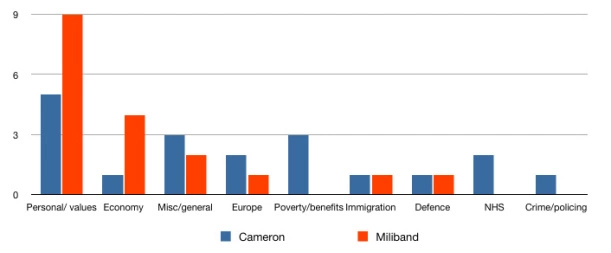We don’t need no education?
Friday 27 March 2015
Last night, David Cameron and Ed Miliband faced questions from Jeremy Paxman and members of the public in the first set piece event of the election campaign. So, in the week that education moved up the polls to become the fifth most important issue facing Britain (after immigration, the NHS, the economy and unemployment), how did it feature?
To help answer this question, in the following chart I’ve made a rough count by theme of the questions asked of each leader. For clarity, I’ve shaded the bars in traditional colours:

The method’s a bit crude, given for example the way Paxman’s final question to Miliband (‘Are you tough enough?’) turned into a succession of three or four questions. But let’s not become too worried about the trees when there’s a great big wood staring us in the face…
In case you missed it, the bizarre truth of the matter is that not a single question about education was asked.
Sure, there were a few occasions where the leaders mentioned education issues in response to questions on other themes. Cameron talked about the need for ‘through-life’ learning in response to a question about the elderly and referred to working to ensure that young people are ‘earning or learning’ and not claiming unemployment benefit , while Miliband took a couple of opportunities to talk about tuition fees. But surely education warrants more attention than this, as inherently valuable and for its key enabling role for every other aspect of government and society?
So, what are the critical education questions that need to be asked? Here’s a few to get us started:
- There are over 17,000 (FTE) unqualified teachers (3.8 per cent) in state funded schools. Would this change under your government, and what impact would this have on the quality of teaching?
- 255 free schools will be open by the end of this school year, with David Cameron promising another 500 in the next parliament. Are more free schools a good idea?
- Overall pupil numbers (in state-funded schools) are expected to grow by 12 per cent between 2014 and 2023 – from 7.1 to 8 million. How will you ensure there are adequate school places in every part of the country?
- Although the unemployment rate among 16-24 year olds has fallen from its high of 22.5 per cent in 2011, it remains unacceptable that one in six (16.2 per cent) of young people are out of work. What will you do to harness the talents of these young people, and ensure we have an education system which meets the needs of our economy and society?
- In 2014, 67 per cent of disadvantaged 11-year-olds achieved the expected level of attainment in reading, writing and maths compared with 83 per cent of all other pupils, a gap of 16 percentage points. At GCSE, this gap is more than 27 percentage points. What more can be done to tackle this?
Given how difficult it’s been to get the leader debates/events agreed, it’s a shame more time wasn’t used to tackle substantive issues such as these, and that much of the focus was on the individual leaders’ strengths and weaknesses.
Fortunately the campaign has six weeks to run, and there remain plenty more opportunities for the party leaders to demonstrate that education is as important to them as the polls suggest it is to voters.
